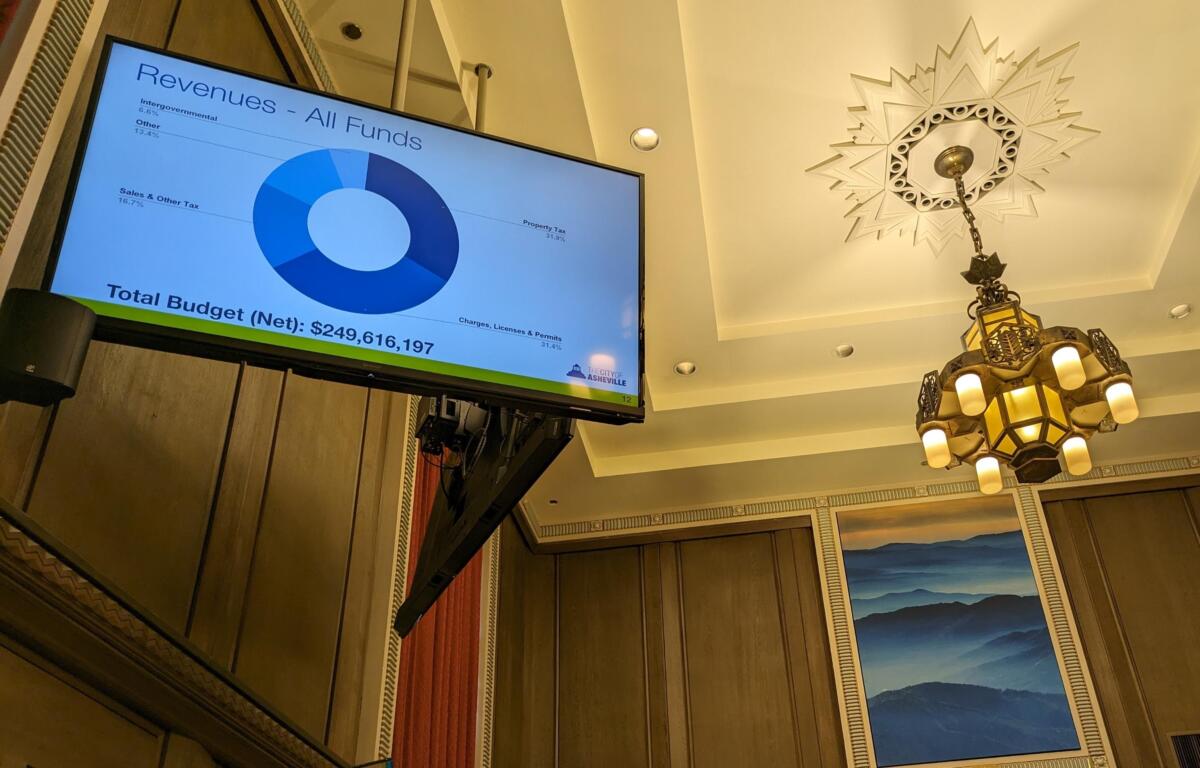ASHEVILLE, N.C. (828newsNOW) —
Asheville plans to dip into savings to balance its budget and avoid tax increases this year, but a property tax hike is almost certain for fiscal year 2025-26, Mayor Esther Manheimer cautioned on Tuesday night.
“We will have to raise property taxes next year,” Manheimer said flatly — and repeated for effect — at the end of a discussion of a proposed $249.6 million budget for fiscal year 2024-25.
City Manager Debra D. Campbell submitted a spending plan Tuesday that relies on the use of $7.8 million from leftover fund balances from prior years’ revenues to maintain city services, address some top council priorities, and give city employees a general salary increase of 4.11 percent.
FACING BUDGET ‘HEADWINDS,’ ASHEVILLE MIGHT ADD PRIORITY POSITIONS
The budget, which will be up for a public hearing May 28, projects reserving a 13.3 percent fund balance at the end of the fiscal year — less than the council’s goal of a 15 percent annual set aside — and that makes it highly unlikely the city will be able to rely on using savings to balance its budget a year from now.
“At this time next year, it’s going to be a painful conversation, unfortunately,” Manheimer told council members and members of the public, including aspiring city council candidates in the audience.
The spending plan for the 2024-25 fiscal year has fewer new spending priorities than in past years.
SIGN UP FOR OUR NEWSLETTER and BREAKING NEWS ALERTS from 828newsNOW.com
It does create seven new positions for the Community Responder Program for efforts to assist people who are unsheltered, experiencing addiction of behavioral health issues. A portion of the cost is offset by opiod settlement funding.
The budget also calls for creating new positions in events management, trash collection, and water and stormwater drainage areas, although those would be financed by fees collected through the enterprise funds.
To fund new Capital Improvement Programs (or CIP), the proposed budget calls for asking voters in November 2024 to approve a $75 million General Obligation (GO) Bond. The budget, outlined by Campbell and Finance Director Tony McDowell, calls for those revenues, if approved by voters, to include: $25 million for affordable housing; $20 million for transportation; $15 million for parks and recreation; and $15 million for public safety facilities.
At Tuesday’s meeting, some council members said they want to increase or adjust those allocations to address priorities like a proposed $3 million restoration of the pool at Malvern Hills Park or additional public safety facilities. That must be decided before the GO Bond request is finalized.
Council member Kim Roney called the spending plan “a maintenance budget using our savings,” and questioned whether residents would be able to sustain multiple tax hits from a bond, a downtown Business Improvement District and the effect of county property tax re-valuations.
During the discussion, Roney repeated her calls for the council to do more to increase wage for city firefighters. “A living wage pledge that excludes our firefighters is not a living wage pledge,” she said.
That drew push-back from others on the panel.
“When you’re telling us that, you’re telling us that we don’t care as much as you,” Manheimer said.
Other council members challenged Roney to identify specific cuts in other areas that she would make to give firefighters additional pay. She said it could come from slight trims across the board from all departments.
The discussion showed how this year’s budget process is a far cry from some recent years, when double-digit increases in sales tax revenue meant for smoother sailing.
As Campbell said in her budget message, “The fiscal year (FY) 2024-2025 Proposed Budget has been prepared under different financial circumstances.”


